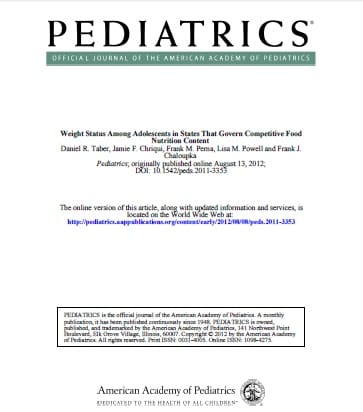 When the New York City Department of Education banned school-day bake sales and regulated vending-machine goodies as means to curb childhood obesity in the Big Apple, we raised eyebrows. Shouldn’t such decisions fall to school—not district or even state—leaders? This new study in the journal Pediatrics, however, has us doubting ourselves. It evaluated Body Mass Index (BMI) data for 6,300 fifth through eighth graders in forty states between 2004 and 2007, and found that students in states with “strong” anti-junk-food-and-sugary-drinks laws gained .25 fewer BMI units than students in states with no laws. (They were also less likely to be obese.) Laws were rated as strong if they had specific standards and requirements; they were weak if they used suggestive language (e.g., “recommend”). Further, students in states with consistent policies enacted across grade levels were the sveltest. The authors present a reasonable case for regulation of junk food in schools—and maybe even a case for state policies mandating such.
When the New York City Department of Education banned school-day bake sales and regulated vending-machine goodies as means to curb childhood obesity in the Big Apple, we raised eyebrows. Shouldn’t such decisions fall to school—not district or even state—leaders? This new study in the journal Pediatrics, however, has us doubting ourselves. It evaluated Body Mass Index (BMI) data for 6,300 fifth through eighth graders in forty states between 2004 and 2007, and found that students in states with “strong” anti-junk-food-and-sugary-drinks laws gained .25 fewer BMI units than students in states with no laws. (They were also less likely to be obese.) Laws were rated as strong if they had specific standards and requirements; they were weak if they used suggestive language (e.g., “recommend”). Further, students in states with consistent policies enacted across grade levels were the sveltest. The authors present a reasonable case for regulation of junk food in schools—and maybe even a case for state policies mandating such.
SOURCE: Daniel R. Taber et al., “Weight Status among Adolescents in States That Govern Competitive Food Nutrition Content,” Pediatrics 130 (2012): 437.
